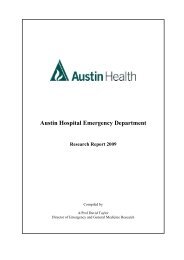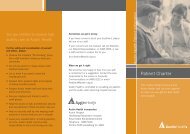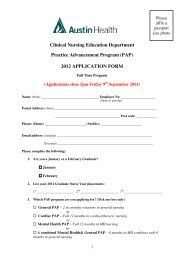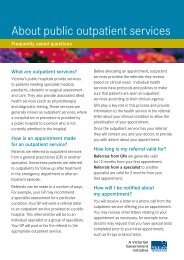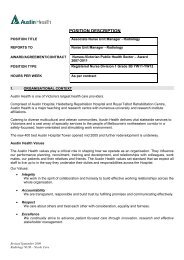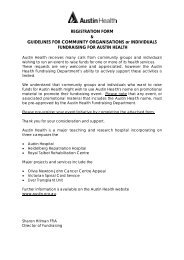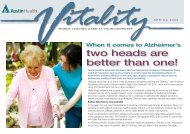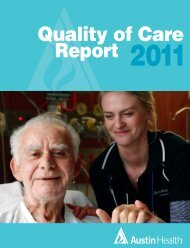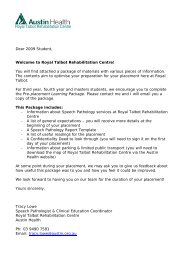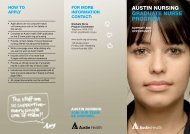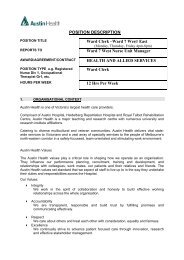Annual Report 2008-09 - Austin Health
Annual Report 2008-09 - Austin Health
Annual Report 2008-09 - Austin Health
You also want an ePaper? Increase the reach of your titles
YUMPU automatically turns print PDFs into web optimized ePapers that Google loves.
Pictured below: Dr Sofianos Andrikopoulos<br />
reviewing research into the cause of diabetes.<br />
a placebo (water) spray, significantly<br />
reduced the pain of intravenous<br />
cannulation. This research won the ‘Best<br />
Paper by a Fellow’ at the Australasian<br />
College for Emergency Medicine <strong>Annual</strong><br />
Scientific Meeting and was published in<br />
the prestigious British Medical Journal.<br />
ED also completed a second RCT<br />
demonstrating that vapocoolant spray<br />
has significant advantages over the more<br />
traditional subcutaneous lignocaine.<br />
INTENSIVE CARE UNIT<br />
As the foremost intensive care research<br />
unit in Australia, the ICU participated<br />
in 18 major international and national<br />
trials, multiple in-house investigatordriven<br />
trials, and national and<br />
international collaborations. Published<br />
in the prestigious New England Journal<br />
of Medicine, the NICE-SUGAR Study<br />
Investigators (20<strong>09</strong>) Intensive versus<br />
conventional glucose control in critically<br />
ill patients showed that the practice<br />
of lowering an ICU patient’s blood<br />
sugar levels to normal levels carries<br />
significant risk of death. Another<br />
significant investigation was whether the<br />
hormone erythropoietin could reduce<br />
the severity of disability from traumatic<br />
brain injury. Prof Rinaldo Bellomo and<br />
Prof Ian Baldwin led research activities<br />
which produced in excess of 50 journal<br />
publications and multiple book chapters<br />
for the year. By this measure, <strong>Austin</strong><br />
<strong>Health</strong>’s ICU is one of the top five<br />
research focussed ICUs in the world.<br />
LIVER TRANSPLANT UNIT<br />
The Liver Transplant Unit (LTU) is<br />
actively involved in clinical research<br />
both nationally and internationally. The<br />
LTU’s national network includes the<br />
NSW Virology Research Lab, studying<br />
antiviral therapy and the prevention of<br />
cytomegalovirus (CMV) disease in liver<br />
transplant patients. With the Anti-Cancer<br />
Council of Australia and the University of<br />
New South Wales, the LTU looked at the<br />
incidence of cancer post-transplantation<br />
and identified risk factors for this group<br />
of patients. With the Royal Victorian Eye<br />
and Ear Hospital, the LTU investigated<br />
the prevalence of age-related macular<br />
degeneration post-transplant. With<br />
the Liver Transplant Unit at Flinders<br />
Medical Centre, SA, the researchers<br />
retrospectively collected data from<br />
patients with cirrhosis and hepatocellular<br />
carcinomas who underwent liver<br />
resection, determining the long-term<br />
survival, the rate of tumor recurrence and<br />
identifying prognostic factors associated<br />
with liver resection.<br />
The Liver Transplant Unit undertook<br />
research with other transplant units<br />
around the globe. Research currently<br />
being undertaken internationally involves<br />
studying the safety and efficacy of<br />
anti-viral medication to enable patients<br />
diagnosed with hepatitis B and C to<br />
safely receive organ transplants and<br />
studying the safety and efficacy of new<br />
anti-rejection medication to improve long<br />
term transplant survival.<br />
<strong>Austin</strong> <strong>Health</strong> : <strong>2008</strong>-<strong>09</strong> ANNUAL REPORT<br />
25



